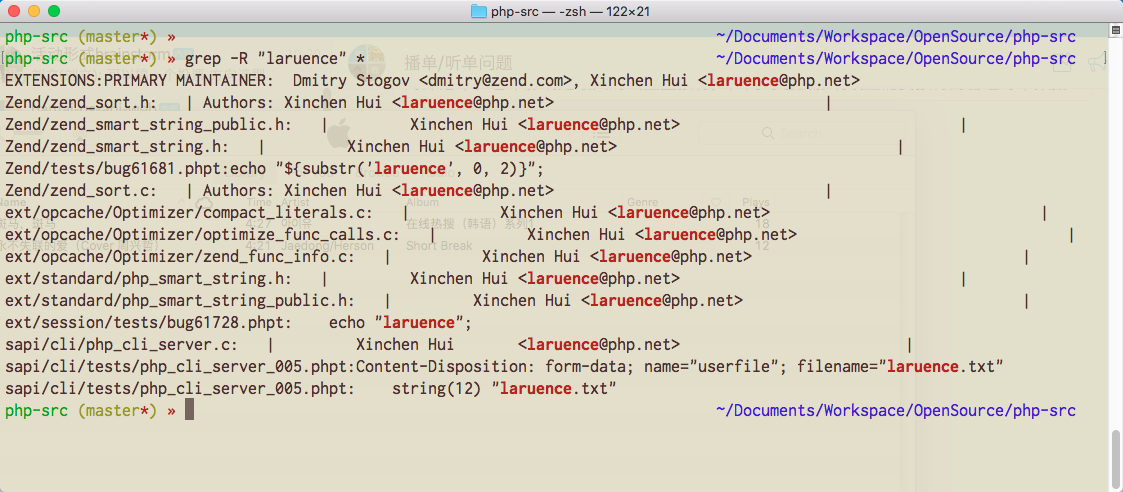Introduction
NCGREP, which is based on ncurses library to provide user interface, is a grep tool for searching text on target directory.
Background
As a VIM party, daily work development will often use grep keyword search to quickly locate the file. As shown:

Use grep for text search
However, there are two efficiency issues with this process:
- The result of the demo cannot be directly interacted, and the path of the manually pasted file needs to be opened
- The results of the show are not grouped, the results are listed directly
One can imagine, when the search result set is relatively large, can be described as painful.
That can be used Vim Ag plug search ah?
Yes, but he only solved the problem of interaction. Still does not solve the pain points of the result set grouping.

Use vim under ag for text search
Ideas
There are great advantages in visualizing loading effects (lazy loading) when using a text-based global search with an IDE such as Eclipse.

Under the Eclipse global file search
So, expect a Linux-based system to provide a similar search tool. Advantages (functions) are as follows:
- The result set can interact directly
- The result set can be grouped
- The result set is loaded by "lazy loading"
What is a class library based on textual graphical interface? Online general understanding of the next VIM, htop similar software, which are based on a class library called ncurses achieved.
Project
Project Name: ncgrep
Why? Because of ngrep, egrep and so on. (Note: ncgrep did not reference grep source)
Project Demo

Code
main.cpp
#include <ncurses.h>
#include <string>
#include <iostream>
#include <vector>
#include <cstdlib>
#include <unistd.h>
#include <thread>
#include "files.h"
#include "grep.h"
#include "tui.h"
#include "data.h"
using namespace std;
void init_screen();
void listen_keyboard();
void dispose_data();
void print_status_line(string msg);
unsigned long yMax, xMax, yWin, xWin;
unsigned long cur_line = 0;
long cur_dir_index = -1;
WINDOW * win;
vector<match_files> mfv;
vector<match_dirs> dirs, used_dirs;
char *dirname;
char *parttern;
int group_level;
bool do_moving = false;
int main(int argc, char ** argv)
{
if (argc < 3) {
cerr<<"Incorrect usage! ncgrep match_pattern file_path [search_group_level]"<<endl;
return -1;
}
dirname = argv[2];
parttern = argv[1];
if (argc == 4) {
group_level = atoi(argv[3]);
} else {
group_level = 1;
}
init_screen();
refresh_win(win, yWin, xWin, used_dirs, cur_dir_index, mfv, cur_line);
thread sub_thread(dispose_data);
listen_keyboard();
sub_thread.join();
endwin();
return 0;
}
void init_screen()
{
setlocale(LC_ALL,"");
initscr();
cbreak();
noecho();
keypad(stdscr, true);
curs_set(0); getmaxyx(stdscr, yMax, xMax);
yWin = long(yMax * 0.6);
xWin = long(xMax * 0.8);
win = newwin(yWin, xWin, (yMax - yWin) /2, (xMax - xWin) / 2);
box(win, 0, 0);
refresh();
}
void listen_keyboard() {
int c;
bool do_continue = true;
while (do_continue && (c = getch())) {
switch (c) {
case 5: if (cur_dir_index == -1) {
break;
}
cur_dir_index = -1;
cur_line = 0;
refresh_win(win, yWin, xWin, used_dirs, cur_dir_index, mfv, cur_line);
break;
case 10:
if (cur_dir_index == -1) {
cur_dir_index = cur_line;
cur_line = used_dirs[cur_dir_index].start;
refresh_win(win, yWin, xWin, used_dirs, cur_dir_index, mfv, cur_line);
} else {
string cmd = "vim " + mfv[cur_line].filename + " +" + to_string(mfv[cur_line].line);
system(cmd.c_str());
endwin();
init_screen();
refresh_win(win, yWin, xWin, used_dirs, cur_dir_index, mfv, cur_line);
}
break;
}
unsigned long min = 0;
unsigned long max = used_dirs.size() == 0 ? 0 : used_dirs.size() - 1;
if (cur_dir_index != -1) {
min = used_dirs[cur_dir_index].start;
max = used_dirs[cur_dir_index].start + used_dirs[cur_dir_index].length == 0
? 0 : used_dirs[cur_dir_index].start + used_dirs[cur_dir_index].length - 1;
}
switch (*keyname(c)) {
case 'q':
do_continue = false;
break;
case 'k':
do_moving = true;
if (cur_line == min) {
do_moving = false;
break;
}
refresh_win(win, yWin, xWin, used_dirs, cur_dir_index, mfv, --cur_line);
do_moving = false;
break;
case 'j':
do_moving = true;
if (cur_line == max) {
do_moving = false;
break;
}
refresh_win(win, yWin, xWin, used_dirs, cur_dir_index, mfv, ++cur_line);
do_moving = false;
break;
case 'o':
if (cur_dir_index == -1) {
cur_dir_index = cur_line;
cur_line = used_dirs[cur_dir_index].start;
refresh_win(win, yWin, xWin, used_dirs, cur_dir_index, mfv, cur_line);
} else {
string cmd = "vim " + mfv[cur_line].filename + " +" + to_string(mfv[cur_line].line);
system(cmd.c_str());
endwin();
init_screen();
refresh_win(win, yWin, xWin, used_dirs, cur_dir_index, mfv, cur_line);
}
break;
}
}
}
void dispose_data() {
print_status_line("loadding...");
vector<string> files_tmp;
vector<match_files> mfv_tmp;
try {
dirs = getdirs(dirname, 0, group_level);
} catch (runtime_error &e) {
cerr<<e.what()<<endl;
return;
}
unsigned long dirs_count = dirs.size();
unsigned long files_count;
for (unsigned long i = 0; i < dirs_count; ++i) {
files_tmp = listdir(dirs[i].dirname, group_level, dirs[i].mode);
files_count = files_tmp.size();
dirs[i].start = mfv.size();
for (unsigned long j = 0; j < files_count; ++j) {
try {
mfv_tmp = match_pattern(files_tmp[j], parttern);
mfv.insert(mfv.end(), mfv_tmp.begin(), mfv_tmp.end());
} catch (runtime_error &e) {
continue;
}
}
dirs[i].length = mfv.size() - dirs[i].start;
if (dirs[i].length > 0) {
match_dirs md;
md.dirname = dirs[i].dirname;
md.start = dirs[i].start;
md.length = dirs[i].length;
used_dirs.push_back(md);
}
if (cur_dir_index == -1) {
while (do_moving == true) {
std::this_thread::sleep_for(std::chrono::milliseconds(50));
}
refresh_win(win, yWin, xWin, used_dirs, cur_dir_index, mfv, cur_line);
}
}
print_status_line("loaded");
return;
}
void print_status_line(string msg) {
mvprintw(yMax - 1, 0, msg.c_str());
refresh();
return;
}
Similar Items
NGP youtube -> https://www.youtube.com/watch?v=MesYBY8271s
Article Source
Hu Xiaoxu => text search tool based on ncurses ncgrep
History
